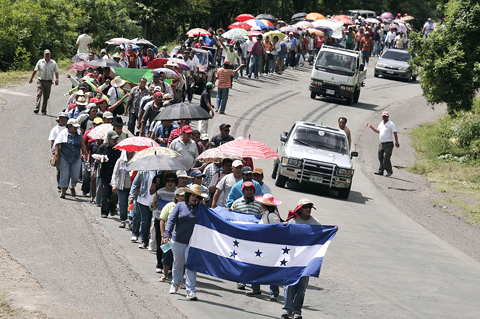More than 3,000 supporters of ousted Honduran president Manuel Zelaya on Monday threatened to boycott a presidential election planned for November if he is not brought back to power.
Protesters converged on the capital, Tegucigalpa, after marching for several days from eastern Honduras, while other groups headed by foot to the northwestern city of San Pedro Sula, the country’s financial center.
“Our goal is to re-establish institutional order by returning president Manuel Zelaya to power,” protest leader Andres Tamayo, a Salvadoran priest and member of the Resistance Front that opposes the June 28 military-backed coup, told reporters. “If the coup leaders don’t accept, there won’t be any elections. We will boycott them.”

PHOTO: EPA
The move was likely to further prolong the crisis that has gripped the impoverished Central American country.
“Get out, putschists, get out, Micheletti,” protestors shouted as they converged upon the center of Tegucigalpa, referring to Honduran interim President Roberto Micheletti, the former president of Congress who was catapulted to the head of the interim government after Zelaya was expelled from the country.
Zelaya, who was in Ecuador, meanwhile called on his opponents to “listen to the people” and denounced the interim government for the deaths of more than 10 young protesters in Honduras.
“They were murdered in the streets because they were marching peacefully and were slaughtered with bullets,” he said during a mass in Quito celebrating the inauguration of Ecuadoran President Rafael Correa.
While Obama has condemned the coup, Cuban President Raul Castro said it could never have occurred without authorization from Washington.
“On this continent, no one has a coup without receiving authorization from the United States,” Castro said, adding that he still had confidence in Obama, who he called a “well-intentioned man.”

Indonesia yesterday began enforcing its newly ratified penal code, replacing a Dutch-era criminal law that had governed the country for more than 80 years and marking a major shift in its legal landscape. Since proclaiming independence in 1945, the Southeast Asian country had continued to operate under a colonial framework widely criticized as outdated and misaligned with Indonesia’s social values. Efforts to revise the code stalled for decades as lawmakers debated how to balance human rights, religious norms and local traditions in the world’s most populous Muslim-majority nation. The 345-page Indonesian Penal Code, known as the KUHP, was passed in 2022. It

‘DISRESPECTFUL’: Katie Miller, the wife of Trump’s most influential adviser, drew ire by posting an image of Greenland in the colors of the US flag, captioning it ‘SOON’ US President Donald Trump on Sunday doubled down on his claim that Greenland should become part of the US, despite calls by the Danish prime minister to stop “threatening” the territory. Washington’s military intervention in Venezuela has reignited fears for Greenland, which Trump has repeatedly said he wants to annex, given its strategic location in the arctic. While aboard Air Force One en route to Washington, Trump reiterated the goal. “We need Greenland from the standpoint of national security, and Denmark is not going to be able to do it,” he said in response to a reporter’s question. “We’ll worry about Greenland in

PERILOUS JOURNEY: Over just a matter of days last month, about 1,600 Afghans who were at risk of perishing due to the cold weather were rescued in the mountains Habibullah set off from his home in western Afghanistan determined to find work in Iran, only for the 15-year-old to freeze to death while walking across the mountainous frontier. “He was forced to go, to bring food for the family,” his mother, Mah Jan, said at her mud home in Ghunjan village. “We have no food to eat, we have no clothes to wear. The house in which I live has no electricity, no water. I have no proper window, nothing to burn for heating,” she added, clutching a photograph of her son. Habibullah was one of at least 18 migrants who died

Russia early yesterday bombarded Ukraine, killing two people in the Kyiv region, authorities said on the eve of a diplomatic summit in France. A nationwide siren was issued just after midnight, while Ukraine’s military said air defenses were operating in several places. In the capital, a private medical facility caught fire as a result of the Russian strikes, killing one person and wounding three others, the State Emergency Service of Kyiv said. It released images of rescuers removing people on stretchers from a gutted building. Another pre-dawn attack on the neighboring city of Fastiv killed one man in his 70s, Kyiv Governor Mykola